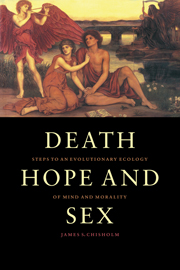2 - Evolution and development
Published online by Cambridge University Press: 02 December 2009
Summary
No living being can be happy or even exist unless his needs are sufficiently proportioned to his means.
Emile Durkheim (1951:246)The main issue in evolution is how populations deal with unknown futures.
C. H. Waddington (1969:122)Individual adaptability is, in fact, distinctly a factor of evolutionary poise. It is not only of the greatest significance as a factor of evolution in damping the effects of selection … but is itself perhaps the chief object of selection.
Sewall Wright (1931:147)The preceding chapter broached the idea that viewing human nature as a manifestation of our reproductive strategies provides the basis for a science of value and a liberal ethical philosophy. My aims in this chapter are, first, to explain how modern evolutionary theory justifies the assumption that the ultimate value in life is reproduction (the continuation of life), and second, to point out some of the implications that flow from this assumption. But to do this it is necessary first to show why evolutionary theory is incomplete without a thoroughly integrated theory of development (and vice versa), and why it is only when evolutionary and developmental perspectives are combined that questions about the phenotypic representations of reproductive value, including our subjective experiences of it, can begin to be answered. A large part of this chapter is devoted to the argument that life history theory is the best candidate for integrating evolutionary and developmental perspectives.
- Type
- Chapter
- Information
- Death, Hope and SexSteps to an Evolutionary Ecology of Mind and Morality, pp. 28 - 76Publisher: Cambridge University PressPrint publication year: 1999



